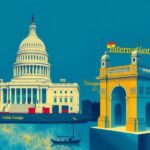Trump Imposes 10% Tariff on UAE and Saudi Arabia Imports Amid Global Trade Tensions
President Trump has announced a 10 percent tariff on UAE and Saudi Arabia imports, forming part of a broader set of tariffs affecting multiple countries. These tariffs have led to volatility in global markets and increased concerns about economic recession and inflation. Critics, including some Republicans, warn of the adverse effects of such trade policies, while the administration claims they will bolster domestic manufacturing.
President Trump has announced a universal 10 percent tariff on imports from the UAE and Saudi Arabia, as part of broader duties affecting numerous countries. This escalation in tariffs, aimed at countering perceived trade injustices, has contributed to a global trade war that poses risks of inflation and economic stagnation. Other affected nations include China, India, and various European countries, with tariffs reaching as high as 34 percent for China.
The tariffs are set to come into effect on April 5 for the UAE and Saudi Arabia, with additional reciprocal tariffs beginning on April 9. Trump characterized this move as “Liberation Day,” asserting that the tariffs are necessary responses to existing trade barriers against U.S. products. Immediate reactions in global markets were negative, with Japan’s Nikkei dropping to an eight-month low and significant losses in U.S. stocks, which have shed approximately $5 trillion in value since mid-February.
China’s new tariff of 34 percent compounds previous duties, prompting calls from its government for the U.S. to rescind the latest tariffs. U.S. Treasury Secretary Scott Bessent cautioned against retaliation from other nations, warning that such actions could lead to escalating prices for consumers. The new tariffs have raised the effective U.S. import tax rate from 2.5 percent in 2024 to 22 percent, marking the highest levels seen since 1910, according to Fitch Ratings.
The reciprocal tariffs aim to enhance domestic manufacturing, with Trump asserting that the U.S. has been “looted, pillaged, and plundered” in trade matters. Despite self-identified benefits to U.S. manufacturing, economists express concerns that the tariffs may harm the global economy, further stress recession risks, and inflate living costs for U.S. families.
Adjacent to this trade reshuffling, Canada and Mexico, two major trading partners, will not experience new tariffs amidst their existing 25 percent duties. While some Republicans have shown apprehension regarding Trump’s trade policies, the Senate has taken steps towards repealing tariffs on Canadian imports. Trump’s economic advisor, Stephen Miran, assured that while there would be short-term disruptions, the overall long-term benefits for the U.S. economy are expected to outweigh these initial challenges.
In conclusion, President Trump’s implementation of a 10 percent tariff on imports from the UAE and Saudi Arabia, along with heightened duties on various countries, signals a significant shift in U.S. trade policy. While aimed at boosting domestic manufacturing and responding to perceived unfair practices, these tariffs elevate the risks of global economic instability, inflation, and potential recession. Resistance within Congress highlights growing concern over the long-term implications of such aggressive trade strategies.
Original Source: www.dubaieye1038.com








Post Comment